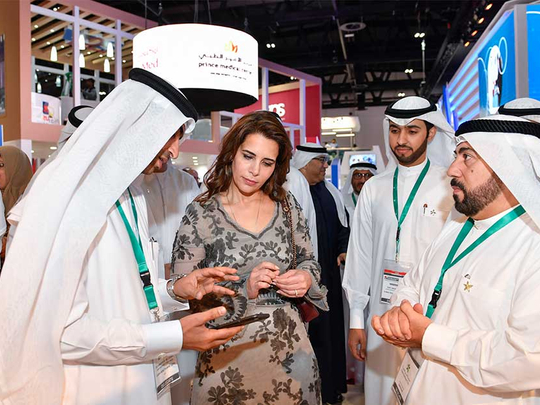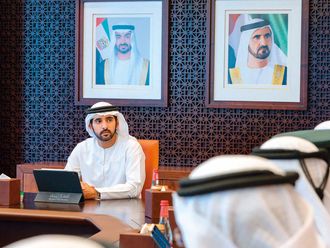
Dubai: Despite advancement in technology and innovation in the medical world, one must never lose the human touch and always endeavour to strike a balance between technology and innovation, and humanity.
This was the dominating theme of the keynote address delivered by Princess Haya Bint Al Hussain, wife of His Highness Shaikh Mohammad Bin Rashid Al Maktoum, Vice-President and Prime Minister of UAE and Ruler of Dubai. Princess Haya who is also the chairperson of Dubai Health Care City and Al Jalila Foundation, made these remarks on the concluding day of the four-day Arab Health 2017 international exhibition and congress.
She congratulated the architects of the event on choosing the theme of technology and innovation, something that resonated with the vision of the Rulers of the UAE. “The combination of ambition and humility is the kind of balance that health care needs, and here in the UAE, we have that balance. Our leadership has embraced technology to ensure quality and it has never forgotten its people. And that is our message to all of you who visit us today. Our nascent system is exemplary in its approach to technology.”
She cited numerous instances of devices developed by the Ministry of Health and Prevention like the use of robotics to conduct surgeries and use of robots in pharmacy and congratulated the innovative streak in the people who initiated it.
However, she cautioned people against forgetting simple skills on account of technology that was replacing such learning.
“There is no longer a need for us to learn how to read a map — just use Google maps. Mental arithmetic and times tables — why bother, just use a calculator. Learning to drive — why would you do that, with the promise of a driverless car that can park itself?
“Like everyone else, I am amazed and enjoy innovative technology, but I do not believe that one shouldn’t learn to do things for himself/herself. We must not accept a future for our children that deprives them of learning the most basic of skills.
“Unfortunately, all too often, over-promise and under-delivery is what we experience. Look into the future if we were to rely fully on available technologies. You would not have travelled to Dubai for this gathering if you could have joined it online!”
She pointed that with the advancement of technology, many things such as genetic data are easily available to people and doctors could make patients swallow a ‘camera pill’ to examine the insides of an individual, but it is important to be able to understand what really is for patient benefit and could in fact cause harm. She cautioned people against taking advice on the internet as in many cases, the advice is incorrect. “The abundantly available information has eroded the once sacred doctor–patient relationship,” she said.
She reminded the audience that innovation however unique is not possible without the human thought process. “ ... who would innovate if we only had standard processes that could be easily automated and controlled by algorithms?” she asked and said, “Look around you, at Burj Khalifa, Dubai Canal, Emirates airline … the list goes on. These are not the ideas of a machine, but rather the vision of a great leader, His Highness Shaikh Mohammad, who defied machines and traditional thinking to achieve what many others would have considered impossible.”
Lauding the advances in the field of medical science and efforts of eminent minds, she urged them to never forget the importance of striking the right balance. “…if you ask our leaders what is most important to them, they would tell you ‘humanity’. And this is my point. This is where the balance lies — we have seen all kinds of machines and technologies that have created the architecture, but in the end, it is for the benefit of the people, to give them a home for the future. This same balance needs to be struck between innovation and medicine.”












